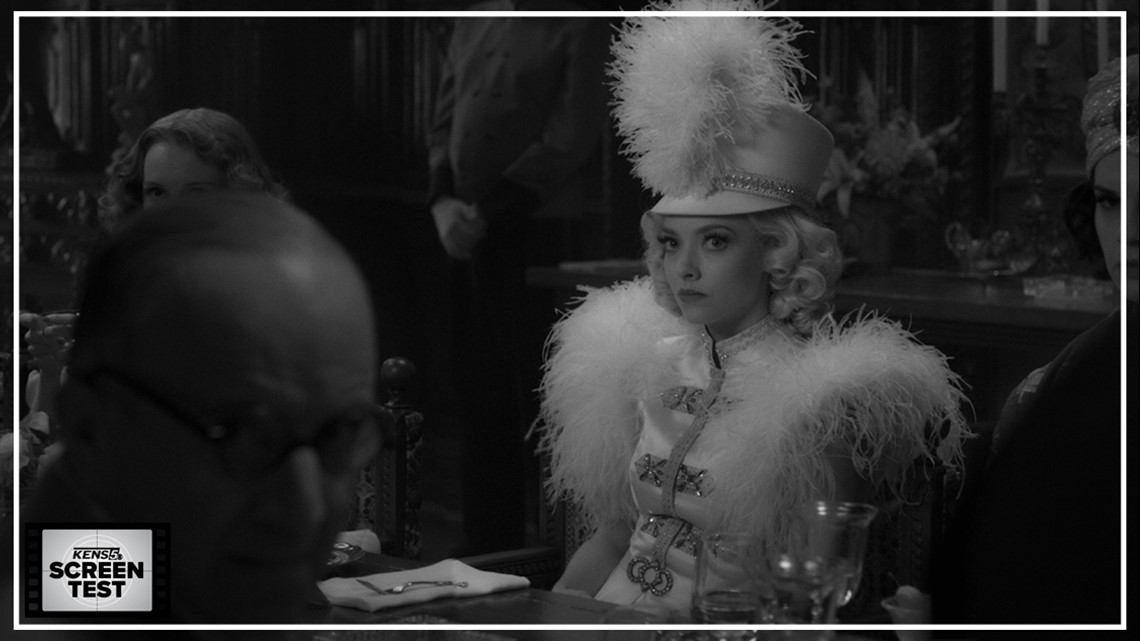No one sits down for a David Fincher movie expecting comedy. It just sometimes turns out that way. Reflecting over the standout sequences conjured up by the author of some of the most perverse mainstream films of the last 20 years usually means reflecting on his most tension-fueled climaxes; could we so easily recall the exact intonations of Brad Pitt’s “What’s in the boooooox?” wails if “Se7en” were directed by another? But pull back on the scope of Fincher’s filmography, and another similarity emerges: His stories of masculine obsession are threaded with the same pitch-black irony that turns Mark Zuckerberg’s world-shifting ascent, Robert Graysmith’s investigative craze and Detective Mills’s epiphany from hell into the stuff of farcical tragedy.
Comedy may be the best lens through which to experience Fincher’s newest movie, “Mank”—a phantasmal and fantastically entertaining work of deep irony, deeper relevance and ever-deepening contradiction that suggests he’s not only embraced his reputation as a storyteller who strives to meet no one’s standards aside from his own, but that he is also ready to weaponize it for his amusement. Ours, too, if we’re willing to humor him. In the case of “Mank” – anticipated as recently as weeks ago as closely following Herman Mankiewicz’s battle with Orson Welles over screenplay credit for that “great white whale” of cinema, 1941’s “Citizen Kane” – humoring Fincher means surrendering to one of the funniest things about the project’s existence: that its purposes are drastically different than that premise teases, and which cinephiles had largely been expecting of Fincher’s first film in six years. As Arliss Howard’s dubious studio exec Louis B. Mayer says at one point: “This is a business where the buyer gets nothing for his money but a memory.”
This isn’t to say the story doesn’t unfold against the backdrop of “Citizen Kane’s” creation, nor that Welles isn’t a central narrative cog; it does, and he is, even if Tom Burke’s portrayal of the classic Hollywood wunderkind is more a presence looming over the proceedings. But the intentions here are vastly more political and – to borrow the word that’s getting plenty of mileage in describing movies this year – timely. Written by Jack Fincher, the director’s late father who passed in 2003, and unspooling along parallel chronological tracks, “Mank” oscillates with escalating urgency between a largely bedridden Mankiewicz (Gary Oldman) working to meet his contractual deadline on a Mojave Desert ranch and flashbacks to various periods in 1930s Los Angeles, where he chummed and chatted with the various power players that he’s said to have based “Citizen Kane” on. The most notable of these is Charles Dance’s intimidatingly regal take on William Randolph Hearst, the media mogul who one day takes a liking to Mankiewicz on an elaborately staged Western film set (Donald Graham Burt designed the production, and the Oscar-winner brings the same exhilarating calculation of scale as he did with previous Fincher excursions).
But as Fincher – operating with that familiar touch of exactness and eagerness to subvert – begins to reveal how the industrial, political and personal confines Mankiewicz inhabited may have been a single shared space, it’s Howard’s Mayer who more immediately emerges as antagonist in a story about Hollywood’s courts of corruption and the jesters who unwittingly find themselves wandering into them. Over both this epoch of Hollywood history and Fincher’s recreation of its constantly buzzing studio lots and lavish parties, the MGM co-founder possesses immaculate influence—and “Mank'' needn't overstretch itself to explain how that translates into having significant influence over the entire state. What the film does spend time exploring are the ways Mayer and Hearst conspire to sway the 1934 gubernatorial election in favor of the Republican candidate, Frank Merriam. It’s an appropriate, perhaps surprising history lesson at a time when the superfluous generalizations of “coastal elites” and “liberal Hollywood” are the daily talk of Twitter and perilously brief attention spans; I suspect it isn’t coincidence that the oval-face, small-statured Howard uncannily resembles Rudy Giuliani while moving between the monochrome shadows of Erik Messerschmidt’s mesmerizing cinematography.
Mankiewicz occupies a front-row seat to this bedfellowship, and Oldman is absorbing as he opts for giddiness in the portrayal before it calls for more existential properties (“If you keep telling people something untrue, for loud and long enough, they’re apt to believe it,” he says at one point, slyly summing up modern philosophies about fake news). He’s eminently cheeky and a slightly chaotic protagonist to rely on, if not for his constant inebriation then for the way he glides through the world dangerously naive to external perception. But the character is only a central strand in a web of figures, among them Irving Thalberg (Ferdinand Kingsley), David O. Selznick (Toby Leonard Moore) and Shelly Metcalf (Jamie McShane). It perhaps goes without saying that your investment in the various tangential interactions scattered throughout “Mank” depends on your scholarly knowledge of 1930s Hollywood, but the attentive viewer might still snag the wherewithal to be absorbed into the dynamics of this richly constructed setting (credit goes to Kirk Baxter’s editing for making it always feeling lively). “Mank” delights in covering a broader canvas than the laser-focused constructions of “Gone Girl” or “The Social Network”; indeed, its closest Fincherian companion may be “Zodiac” in how it presents a coherent network of figures before complicating the various strands of connection.
In this regard, one of “Mank’s” most thrilling pleasures resides in the dynamism of its writing (appropriately enough, given the film’s subject matter), and in the symbiosis of both Finchers’ contributions as free-flowing conversations transition organically from the personal to the political; from talk of who will play Marie Antoinette to the vehemently opposed socialist agendas of Upton Sinclair (the actor who plays him, briefly glimpsed from a distance, might be the most amusing cameo of the year). In these scenes “Mank” also proves itself to be Fincher’s funniest film in how it weaves sly hints of cynicism into arenas of dialogue that often feel downright carnival; one early scene at the massive Hearst residence (Xanadu, perhaps?) stands out for the constant volleys of opposing perspective as interpersonal tensions come to a boil.
For that matter, intimate conversations in “Mank” are just as inviting. There’s a lyricality to Oldman’s warmth that jives beautifully with Amanda Seyfried’s aspiring actress Marion Davies as they stride through darkened LA streets. I should take this moment to note that Seyfried’s performance might be the movie’s most valuable, coming in the form of the character with the most range. And Seyfried is so excellent at maneuvering that range – from youthful exuberance to icy stares – that it comes to inform our evolving loyalty to Oldman’s protagonist as he becomes an increasingly volatile insubordinate within Hearst’s close circle. It’s career-best work from an under-appreciated actress, made all the better for how it adds dimension to the flair her Oscar-winning costar brings to the table.


Jack Fincher’s screenplay may hesitate to tread fully into “movies are magic” territory in favor of commentary about a gilded Hollywood, but it’s one of “Mank’s” many paradoxes that his son doesn’t pass up the opportunity to go for aesthetic broke. Pains are taken to turn “Mank” into a product of its contextual setting, including ashy black-and-white photography and, more impressively, astonishingly transportive sound design. Your ears aren’t fooling you; dialogue is flecked with period-appropriate distortion in an intriguing attempt toward perfect imperfectness. Elsewhere on the auditory spectrum, regular Fincher collaborators Trent Reznor and Atticus Ross have crafted another stunning score that evokes the joviality of show biz and also the shadowy intrigue of urgent ultimatums; this is still a story that touches on the enduring struggle between commercial viability and artistry, and the collateral damage that comes of it. It’s continuously impossible to separate the atmosphere of a Fincher work from the musical contributions of Reznor and Ross that maximize its potency.
All these elements have important roles to play as Mank’s position in the industry comes to be challenged and “Mank” increasingly skirt conventionality for a haziness that’s reminiscent of being in our protagonist’s shifting (and not ever entirely sober) headspace. A sense of listlessness in the third act accentuates the murkiness of memory – of a life and of an entire industry – without losing its dramatic footing. If we were to identify the Rosebud of “Mank,” it may be the malleability of cinematic history itself, beginning with how Mankiewicz spins his era into one of cinema’s most monumental works.
Because of what we know now about the legacy that “Citizen Kane” went on to foster in the decades since its release, “Mank” makes for another strong entry into Fincher’s catalogue of historically informed fables of patriarchal manifest destiny. But through its prickly humor and stylistic inebriation, it more directly makes the case that we should scrutinize Hollywood history as much as we celebrate it. Sure, that argument most readily extends to its release on the industry-upender that is Netflix, but shifting our gaze to some of the last decade’s most successful movies offers more intriguing context: Fincher’s film is far from the sweetened tribute to cinema that is “The Artist” or “La La Land,” and even further from the movies-as-literal-savior machinations of “Argo” (three films that, notably, were anointed Best Picture at the Oscars, even if “La La Land’s” triumph was fleeting). Consider the almost comical lack of suspense that underscores Mankiewicz’s screenwriting endeavor in the Mojave Desert, and “Mank” also comes to be about expectation—expectation of artistry, of industry, of overlapping personal motivations either mistrustful or transparent.
The film does confront those expectations we may have built up for it, via an ostentatiousness climax that some will inevitably find frustrating, if not maddening. It knows we expect it to provide some semblance of clarity, perhaps a new revelation, maybe a final word in the Hollywood fable of Welles/Mankiewicz. Which is why it’s slightly ingenious – and, yes, tremendously funny – that the Finchers conclude in a place where we one day imagined they might have begun. “Mank” knows there can’t be a last word; that goes against the very nature of the medium. The movies will always go on, and on, and on.
"Mank" is rated R for some language. It starts streaming on Netflix Friday.
Starring: Gary Oldman, Amanda Seyfried, Lily Collins, Tom Pelphrey
Directed by David Fincher
2020
OTHER SCREEN TEST REVIEWS:
- ‘Nomadland’ Review: Frances McDormand ventures west in a lament and tender celebration of America’s final frontiers
- 11 streaming recommendations for December
- ‘Hillbilly Elegy’ Review: A purposeless diagnosis in a moment that demands more
- ‘Sound of Metal’ Review: An innovative feat of auditory filmmaking, and a career-best Riz Ahmed
- ‘The Twentieth Century’ Review: The most absurdly demented movie of 2020
- ‘Run’ Review: You’ll be way ahead of ‘Searching’ director’s frustratingly neat new thriller
- ‘Ammonite’ Review: Kate Winslet, Saoirse Ronan star in deceptively simple tale of budding seaside love
- ‘The Climb’ Review: An unconventional bromance stings with its comedy, languishes in its drama
- ‘The Trial of the Chicago 7’ Review: A stellar cast boosts Aaron Sorkin’s simplified courtroom epic

